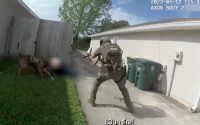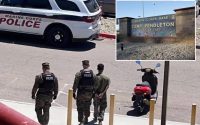Feds probe whether Salman Rushdie’s accused NY stabber had Hezbollah terror ties
Federal prosecutors are investigating whether the Islamic fanatic accused of repeatedly knifing Salman Rushdie onstage last year had ties to any foreign governments or terrorist groups, according to a report.
Chautauqua County District Attorney Jason Schmidt, who is overseeing the New York state case against 25-year-old Hadi Matar, told Semafor that the US Attorney’s Office has launched a separate probe into the suspect’s potential links to international organizations.
Matar, the son of Lebanese immigrants living in New Jersey, has pleaded not guilty to charges of assault and attempted murder in the frenzied attack on the celebrated British-American author at a literary festival in upstate New York last August.
Rushdie, 75, who was the target of an infamous Islamic death edict in 1989 over his book “The Satanic Verses,” was left blinded in his right eye.
Schmidt said his office is wrapping up its preparations for Matar’s trial, which could start as early as next year.

But the Department of Justice’s concern, which Schmidt said was outside his jurisdiction and above his “paygrade,” is whether Matar, who was known to have spent time in Lebanon, may have been radicalized or trained by the Islamist militant group Hezbollah.
At the time of his arrest Aug. 12, 2022, Matar was found to be carrying a fake driver’s license bearing the name of a top Hezbollah commander.
“There are some areas that we have to sort of confine ourselves to the four corners of the charges that we’ve asserted, which is essentially an attempted murder in the second-degree charge. That’s our top count,” Schmidt told the outlet. “That gets us away from some of the underlying motivations that went into the intent. Some of that have been sort of removed from us in our jurisdiction, and that’s something that the US Attorney’s Office has been looking at and they are dealing with.”
The DOJ did not immediately respond to a Post request for comment Friday.
A main question from the attack has been whether Matar was a lone wolf or acted on behalf of Hezbollah or the Iranian regime.

Matar’s mother, Silvana Fardos, has told the New York Times that her son traveled to Lebanon in 2018 and likely stayed with his father in the town of Yaroun, which is known to be controlled by Hezbollah.
Matar returned from that trip a Shiite zealot devoted to Iran’s Islamic revolution, according to his mom, who publicly disowned him in the wake of the attack on Rushdie.
The famous victim — and Indian-born Booker Prize winner — spent years in hiding with police protection after Iran’s Grand Ayatollah Ruhollah Khomeini issued a fatwa, or edict, in 1989 calling for his death over the alleged blasphemy of the novel “The Satanic Verses.”
Nearly a decade later, the Iranian government distanced itself from the order, saying it would not back any effort to kill Rushdie — but the fatwa was never officially revoked.
In an exclusive jailhouse interview with The Post just days after his arrest, Matar praised the late Ayatollah Khomeini as a “great person” but would not say whether he was inspired by his fatwa against Rushide.
The suspect denied being in contact with Iran’s Revolutionary Guard and indicated that he was acting alone when he decided to drive up to Chautauqua after coming across a tweet about Rushdie’s upcoming visit.
“I don’t like the person. I don’t think he’s a very good person,” he said about the “Midnight’s Children” writer. “I don’t like him. I don’t like him very much. He’s someone who attacked Islam, he attacked their beliefs, the belief systems.”
Tehran denied any role in the near-fatal attack on Rushdie last year but said, “Regarding the attack against Salman Rushdie in America, we don’t consider anyone deserving reproach, blame or even condemnation, except for [Rushdie] himself and his supporters.”
Rushdie, who also suffered nerve damage to his hand, has not blamed any foreign entities for the stabbing that nearly ended his life.
Asked about Matar’s upcoming trial, Rushdie told BBC News in July that he is not sure if he can “be bothered” to face him in court.


